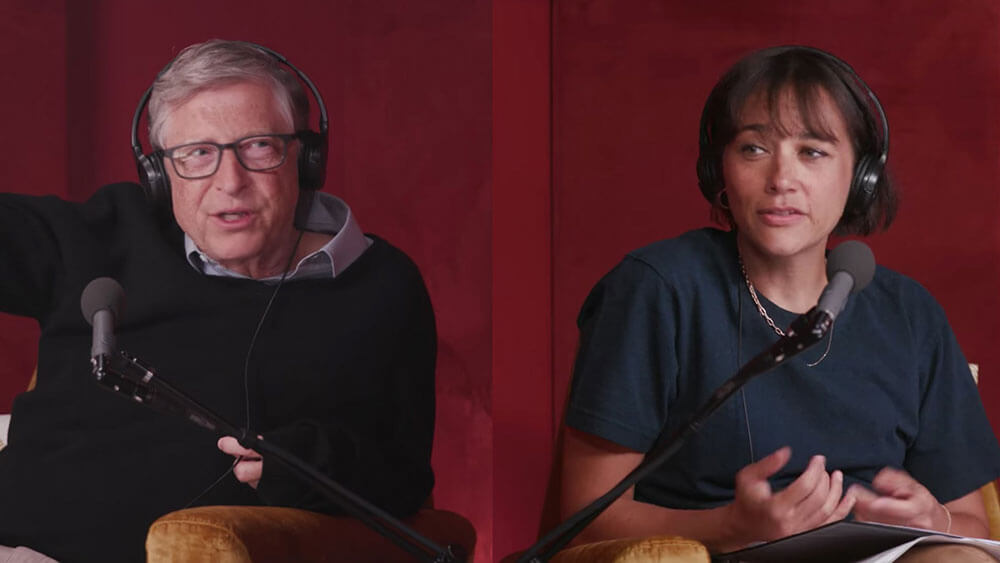
In the first episode of their new “Bill Gates and Rashida Jones Ask Big Questions” podcast, the hosts talked about the pandemic with infectious disease expert Dr. Anthony Fauci. (Courtesy GatesNotes)
Since Microsoft founder-turned-philanthropist Bill Gates predicted how ill-prepared we would be for our current pandemic in his TED talk five years ago, when he offers his perspective on our post-pandemic future, “we should all sit up and take notice,” according to a recap of his podcast conversation in Inc.
The podcast is a conversation between Gates and actor Rashida Jones — “Bill Gates and Rashida Jones Ask Big Questions” — and who better to kick things off for the launch episode on the pandemic than guest Dr. Anthony Fauci, director of the National Institute of Allergy and Infectious Diseases. Fauci shares how a COVID-19 vaccine rollout will take shape, and how we have to remain vigilant by following all the protocols, including limiting your interactions with others, wearing a mask, and washing your hands.
Here are Gates’ seven predictions for a post-pandemic future:
- Remote meetings will become the norm. Pre-pandemic, Gates said, you might have worried that a client would feel slighted if you suggested a conference call rather than a face-to-face meeting. But after COVID, people will assess whether a business meeting (or a business event) — or a visit to the doctor — is really necessary, or if the same objective can be achieved virtually. “This idea of, ‘Do I need to go there physically?’ We’re now allowed to ask that,” he said.
- The online experience will get better. Not only will it be more natural to meet virtually, Gates said the software will dramatically improve for a better experience. “The software was kind of clunky when this all started, but now people are using it so much,” he said, adding that we’ll be “surprised by how quickly we’ll innovate with the software.” Which is good news for online event organizers — and their audiences.
- The corporate office will be shared. We’ll be going into the office less often, Gates said, which means that companies will look at their real estate differently. Gates suggests that different companies could share offices, having their employees come in on different days.
- Our communities will be reshaped. Downtowns will be less important with more remote workers, and the suburbs will grow in importance. “In the cities that are very successful,” Gates said, giving Seattle and San Francisco as examples, “even for the person who’s well-paid, they’re spending an insane amount of their money on their rent.” Without the need to commute to an office every day, expensive cities are less appealing, and a bigger house in a smaller community is more so, he said.
- Our social hubs will change. Related to the above, we may spend less time socializing with our colleagues and more time with our loved ones in your local community, he said.
- Things won’t go back to normal for a long time. “There’s a phase where we’re going to have the numbers be super low in the United States, but it’ll still be out in other parts of the world, so you could get a resurgence,” Gates said. “I think a lot of people will remain quite conservative in their behavior, particularly if they associated with older people whose risk of being very sick is quite high.”
It’s a sobering statement for those who think a widely distributed vaccine in the U.S. will mean a full return for the travel and business events industry. The rest of the world will need to have the virus under control as well.
- The next pandemic won’t be nearly as bad. “The main reason it’ll have less destructive impact is we will have practiced,” he said. We will have learned from countries like South Korea and Australia, Gates said, which quickly tested and quarantined people “and our tools for testing will be way better.”
And who would have thought that Gates’ next prediction would sound so hopeful as we round the corner on 2020: “We won’t be this stupid the second time around.”
Michelle Russell is editor in chief of Convene.
